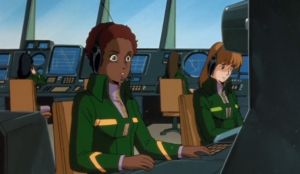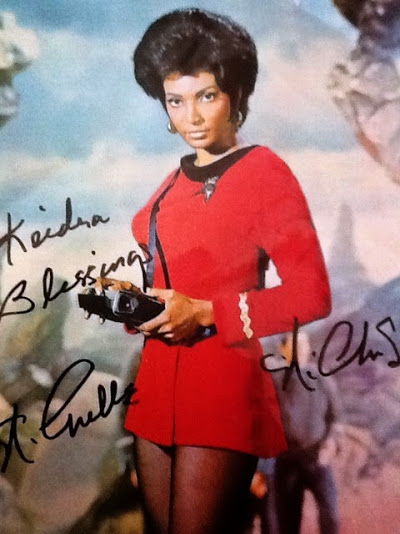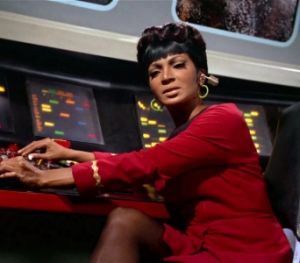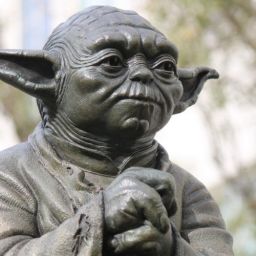by Keidra Chaney
This past week was the 48th anniversary of Star Trek‘s premiere as a TV series on NBC. Coincidentally, this week I also listened to an old interview with Neil DeGrasse Tyson and Nichelle Nichols, as she talked about her iconic role as Lt, Uhura, and her career-altering conversation with Dr. Martin Luther King Jr. who convinced her to stay on the show after she considered leaving after the first season. It’s a great conversation and an illuminating story. Nichols is a talented singer and live theater actress; she was considering leaving television to return to the stage, when Dr. King met her at an NAACP fundraiser:
“Miss Nichols, I am your greatest fan.’ I thought – ‘what an incredible moment.’ I just, was flabbergasted. And he begins to speak about my role on television, and the power of Star Trek, and how important it is…
In the meantime, for the first time in my life, I had no words to say. I could speak anyway, I’m shaking in front of this man. And he is saying how important Star Trek is to the future. That this man who has written this, who has produced this, has seen the future – and we are there, because you are there. He said “you have one of the most important roles. This is a first. It’s non-stereotypical, it’s brilliance, it’s beauty, and it’s intelligence. And you do it with warmth and grace.”
To serve as a public role model is a heavy responsibility for any actor to live up to. But Nichelle Nichols’ choice to stay has influenced and changed the lives of generations of Trek fans. It certainly changed me.

As a second-gen Trekkie, geek and black lady, Uhura has long served as an avatar of sorts for me, as I am sure she has for many other black geeks. I’ve dressed up as her for several Halloweens and even played a show with my band dressed up as her. My Uhura costume is more than a tribute to her character, but a public shorthand of sorts, a way to declare my nerdiness and my black-womanness in equal measure. For me, watching Star Trek with my family on Sunday afternoons before dinner, Uhura represented not only beauty, smarts, and professionalism but most importantly adventure. The kind of adventure that didn’t include black women. Space adventure.
It’s often argued that by today’s sophisticated TV standards, Uhura is hardly a three-dimensional television character; her voice, or motivations or desires don’t propel any story. She’s there mostly in the background, and mostly in a mini dress. And yesyesyes a feminist critique of women characters on the original Star Trek will find her depiction as problematic. But there’s contemporary sci-fi that passes the Bechdel Test, yes, but still see black women as non-entities. Uhura, in 1966, was there, she was present, and her presence was powerful.
And while not as well known as Uhura, for a subset of Gen-Xers and young Millenials, another character played a similar role: Claudia Grant of the 80’s anime Robotech. I would even say for me personally, Claudia was an even bigger influence on me as a youngster than Uhura was, though Nichelle Nicols/Uhura’s impact endured longer. Maybe this is in part because Claudia

In a previous blog post, I mentioned that when it comes to television and pop culture, not seeing my life experience and likeness reflected on screen isn’t necessarily a deal breaker for me, but at the same time, representation is incredibly important, especially in sci-fi. Of all the genres where you can imagine all sorts of possible realities and futures to see people like you as a part of those worlds makes an impact. And to see yourself erased from it means even more. There’s certainly some kind of unsettling collective statement in the proliferation of dystopian future teen romances with plucky white girls at the center of them all. There’s so much room for so much more in sci-fi TV and film (seriously, it’s simply offensive that there’s not been an Octavia Butler adaptation for TV or film yet.) but sometimes even little things mean a lot.
There’s a scene in Guardians of the Galaxy, early on in one of the cities, where I spied one of the people in the crowd, a black woman with a teeny weeny afro, and did a little dance of joy in my seat. “We’re here!” I thought! “We exist in the far reaches of outer space!” I know it sounds ridiculous, but I also imagine a girl not too much older than I was when I first saw Uhura and Claudia feeling the same way. When you know that black girls are in the future, you feel empowered to do anything.





Yessss, I love Uhura! My original Mego Uhura action figure is my prize nerd booty. Her autobiography is partly hilarious and partly horrible. It seems the 1960s weren’t as perfect as they seemed (shock, horror).
I think W Kamau Bell coined the portmanteau “blerd”, which should be self-explanatory.
A thing i really REALLY like about TOS is how Roddenberry portrayed the future non-American humans. When Sulu (I know, he’s born in San Francisco, but anyway) gets drunk on polywater, he wields a foil, not a katana, and he imagines himself as D’artagnan, not a samurai. Similarly, Uhura plays the harp (in “Charlie X”, IIRC), not the djembe. This continues in ST:TNG, where Picard drinks earl grey instead of chainsmoking Gitanes and drinking wine.
I don’t know if Americans pick up on this, but it is immensely frustrating whenever I see a person from country X depicted as having only country X hobbies and interests. I may be a Swede, but i don’t listen to Abba, use IKEA furniture or wear horned helmets. I would if I was a character on a US TV show, though.
One thing I hate about ST:TOS is how Uhura’s role became more and more that of a receptionist. She’s a goddamned communications officer, she needs a dictionary to speak Klingon? In ST VI? A hard copy PAPER dictionary? After literally decades on the comms? (/End nerd rage)
Desilu studios shot both Star Trek and Mannix at around the same time, I think. Mannix had another Regular Black Lady Character Who Is A Real Person; Peggy (Gail Fisher, who was showered with awards for that role). I vaguely remember reading that Nichelle and Gail were friends IRL.
Also, you look spectacular in a TOS dress wielding a bass. I’m gonna have to squeeze myself into my golden captain’s tunic now. Appositely, I’ve developed quite the Shatnerian gut since I had it made.
Thanks for reading! I actually didn’t know about Mannix and now I want to check it out.
I do think Uhura was demoted later on to essentially be a glorified receptionist, and I would rather blame it on NBC than Roddenberry.
Yeah, Mannix was great. Sort of like Rockford files. The theme song by Lalo Schifrin is a lovely swing-waltz, and the split-screen title sequence is as 60s as it’s gonna get. Peggy shows up in season 2. Don’t get your hopes up though, she is basically Uhura in a detective agency. At the time though, that was probably a big step in the right direction. [Old episodes are available on youtube.]
Not a woman, but Black Science Person In The Sixties: Mission Impossible had Barney Collier (Greg Morris) as the techno/electronics genius. The only cool thing about the awful 1980s remake was that Greg’s IRL son Phil played Barney’s son Grant. (and hey wouldntyaknow, Lalo Schifrin is the composer of the famous M:I theme song). M:I also get a point for having Eartha Kitt as a very able field agent in one episode.
Which reminds me that Eartha was the best Catwoman ever. All other actresses have portrayed Catwoman as some kind of seductress, but Eartha really brings out the egotistical swagger of a real cat. I can’t imagine anyone else hamming it up with the same manic intensity and awful puns. And she had a very very funky car. https://www.youtube.com/watch?v=nbPo6zekYxw
Haha, this is almost exactly how I feel seeing Asian women in sci fi 🙂 Even the quarter-Asian River Tam in Firefly delighted the heck out of me, though I was disappointed that a future space world that was set up as the descendants of mainly American and Chinese people contained no full Asian main characters in the ensemble.
The same holds true right now when seeing family-type sitcoms featuring Asian families – other than the short-lived All American Girl, for the longest time the only places you’d see Asians in that genre on TV was as extras on, say, the Cosby Show. (I found it interesting that in both the Cosby Show and the Fresh Prince, the youngest female child in the family would occasionally have an Asian child in tow as part of her circle of friends – perhaps an equivalent of the black best friend?) Basically any point where an Asian woman is on TV without being a prostitute or a submissive is a happy moment.
…. Things still really blow for even smaller minority groups though – Native Americans, Pacific Islanders, Middle-Easterners, recent African immigrants etc. I wonder if there are a lot of positive examples for sexual minorities in media as well.
You are SPOT ON about the Asian BFF Cosby Show and Fresh Prince. That’s actually worth exploring in an essay.
DDR (East Germany) leads the way when it comes to Asian women in space! Here’s “Der Schweigende Stern” from 1960, but in an American redub: https://www.youtube.com/watch?v=PjvRHMXFHxA
Note how extraordinarily multiracial the scientists are. And this is not done to grudgingly appease or cash in on minorities in DDR, as there were none. It’s probably done purely as a socialist international thing: “See what we can accomplish together”.
DDR also made all those Wild West films where the cowboys were the bad guys and the Natives were the heroes. Socialist cinema is really underrated.
I have a question regarding Asians in US TV (I am Swedish). Have you noticed lately how there are more and more Asian regular-but-not-main characters? Especially in cop settings. Dexter had that pervy lab guy, Sleepy Hollow has John Cho, Grimm has Officer Wu (who’s actually competent and not there for comic relief). I don’t know if this is a trend, as I don’t watch that much US television. But it looks almost like someone thought “ok, we have to have an Asian here… make him the desk sergeant, he’ll be on screen in every episode at least”.
It’s like when the detectives come to a crime scene, you know there’ll be an officer Park there putting up the POLICE LINE tape or a doctor Wong dusting for prints in the background. But there’s never a detective Park or Wong. Would you say this is a correct observation, or am I really off base and have just seen unrepresentative TV series?